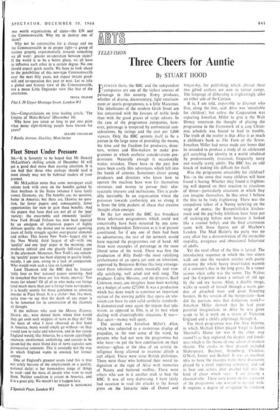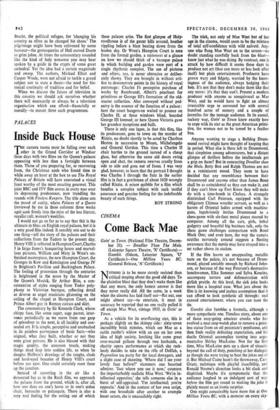Three Cheers for Auntie
TELEVISION
By STUART HOOD
ETWEEN them, the BBC and the independent p companies are one of the richest sources of patronage in this country. Every producer, whether of drama, documentary, light entertain- ment or sports programmes, is a little Maecenas. The inhabitants of the modern Grub Street are less concerned with the favours of noble lords than with the good graces of script editors. In the case of the programme companies, how- ever, patronage is tempered by conimercial con- siderations, by ratings and the cost per 1,000 viewers. Only the BBC permits itself to be a patron in the large sense of providing the means, the time and the freedom for producers, direc- tors, writers and film-makers to make pro- grammes in which aesthetic considerations pre- dominate. Naturally enough it occasionally makes mistakes. There have in the past few years been costly film adventures which fell into the hands of coteries. Sometimes clever young producers and directors who know how to operate the machine have won for themselves resources and money to pursue their idio- syncratic interests and inclinations. This is prob- ably inevitable. In an organisation where the pressures towards conformity are so strong it is from the little pockets of chaos that creative thought often emerges.
In the last month the BBC has broadcast three television programmes which could not conceivably have been mounted by any com- pany in Independent Television as it is at present constituted; for if any one of them had been so adventurous, the rest of the network would have rejected the programmes out of hand. All three were examples of patronage in the most liberal sense of the word. There was first the production of Billy Budd—the most satisfying performance of an opera yet seen on television, approved by Benjamin Britten (his long estrange- ment from television over), musically and visu- ally satisfying, well acted and well sung. The producer, Cedric Messina, and the director, Basil Coleman, must, one imagines, have been working on a budget of some £27,000. It was a production which has done much to convince an important section of the viewing public that opera on tele- vision can have its own valid aesthetic standards. It demonstrated once again the truism that tele- vision, as opposed to film, is at its best when dealing with claustrophobic situations. It was— that apart—money well spent.
The second was Jonathan Miller's Alice, which was subjected to a monstrous display of prejudice, in the root sense of the word, by persons who had not seen the programme but who were—to put the best construction on their motives—aghast at the idea of an artistic in- telligence being allowed to examine afresh a cult object. There were stout British philistines. There were those who bolstered their moral in- dignation at the rape of Alice with memories of Nanny and buttered muffins. There were others who saw in it another stick to beat the BBC. It was all very depressing. I have lately had occasion to read the attacks in the Soviet press on the fantastic tales of Daniel and
Sinyaysky, for publishing which abroad these two gifted authors are now in labour camps. The language of illiberality is frighteningly alike on either side of the Curtain.
It is, I am told, impossible to discover who first, along the line, said Alice was 'unsuitable for children'; but unless the Corporation was expecting Jonathan Miller to give it the Walt Disney treatment the thought of placing the programme in the framework of a cosy Christ- mas schedule was bound to lead to trouble. The truth of the matter is that Alice is as much a children's book as The Turn of the Screw. Jonathan Miller had never made any bones that he intended to produce a study of an adolescent girl searching for identity in a world inhabited by predominantly irrational, frequently nasty and usually scatty adults. The BBC has an odd knack of making life difficult for itself.
Was the programme unsuitable for children? Yes—in the sense that many children will have found it boring. Whether they found it frighten- ing will depend on their reaction to situations of threat—particularly situations in which they can imagine themselves. In this sense I believe the film to be truly frightening. There was the compulsive talker of a Nanny teetering on the verge of mania; the Rumpelstiltskin kitchen- maid and the pig/baby (children have been put off sucking-pig before now because it looked like a roasted baby); and the final courtroom scene with those figures out of Mayhew's London. The Mad Hatter's tea party was no cosy affair but a demonstration of the invincible stupidity, arrogance and obsessional behaviour of adults.
Yet the total effect of the film is lyrical. The introductory sequence in which the two sisters walk out into the meadow catches with poetic economy the whole heavy insect-laden warmth of a summer's day in the long grass. In a comer sesoun when softe was the sunne. The Walrus and the Carpenter dance a minuet of old age by the sad sea waves. Alice, a double image, walks in search of herself through a warm gar- den of pleached trees and great flowering borders. In his version of the Symposium—how did the puritans miss that dangerous work?— Jonathan Miller showed that he had great pictorial imagination; in Alice he was given scope to let it work on a vision of Victorian England and a child's pilgrimage through it.
The third programme was The New Inferno, in which Michael Elliot 'played Virgil to James Maxwell's Dante (or was it the other way round?) as they explored the despair and loneli- ness which is the theme of one school of modern theatre. The circles in their descent included Shakespeare, Biichner, Strindberg, Chekhov, O'Neill, Genet and Beckett. It was an excellent idea to have the excerpts from these dramatists played by a small repertory company; and -iad to hear one actress after another fall into the kind of chant which says: 'I ani playing a classical role.' There were points in the irgument of the programme one wanted to nu irrel with. It requires a degree of arrogance to condemn Brecht, the political refugee, for `changing his country as often as he changed his shoes.' The pilgrimage might have been enlivened by some humour—the grotesqueries of Hell moved Dante to grim jokes. At times the commentary sounded like the kind of holy nonsense you may hear spoken by a guide in the crypts of some great cathedral. Yet the idea had a certain magnitude and sweep. The authors, Michael Elliot and Caspar Wrede, were not afraid to tackle a grand subject nor to state a thesis—the need for his- torical continuity of tradition and for belief.
When we discuss the future of television in this country we should ask ourselves whether there will necessarily or always be a television organisation which can afford—financially or morally—to mount three such programmes.







































 Previous page
Previous page